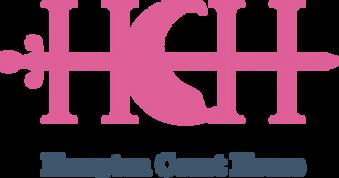
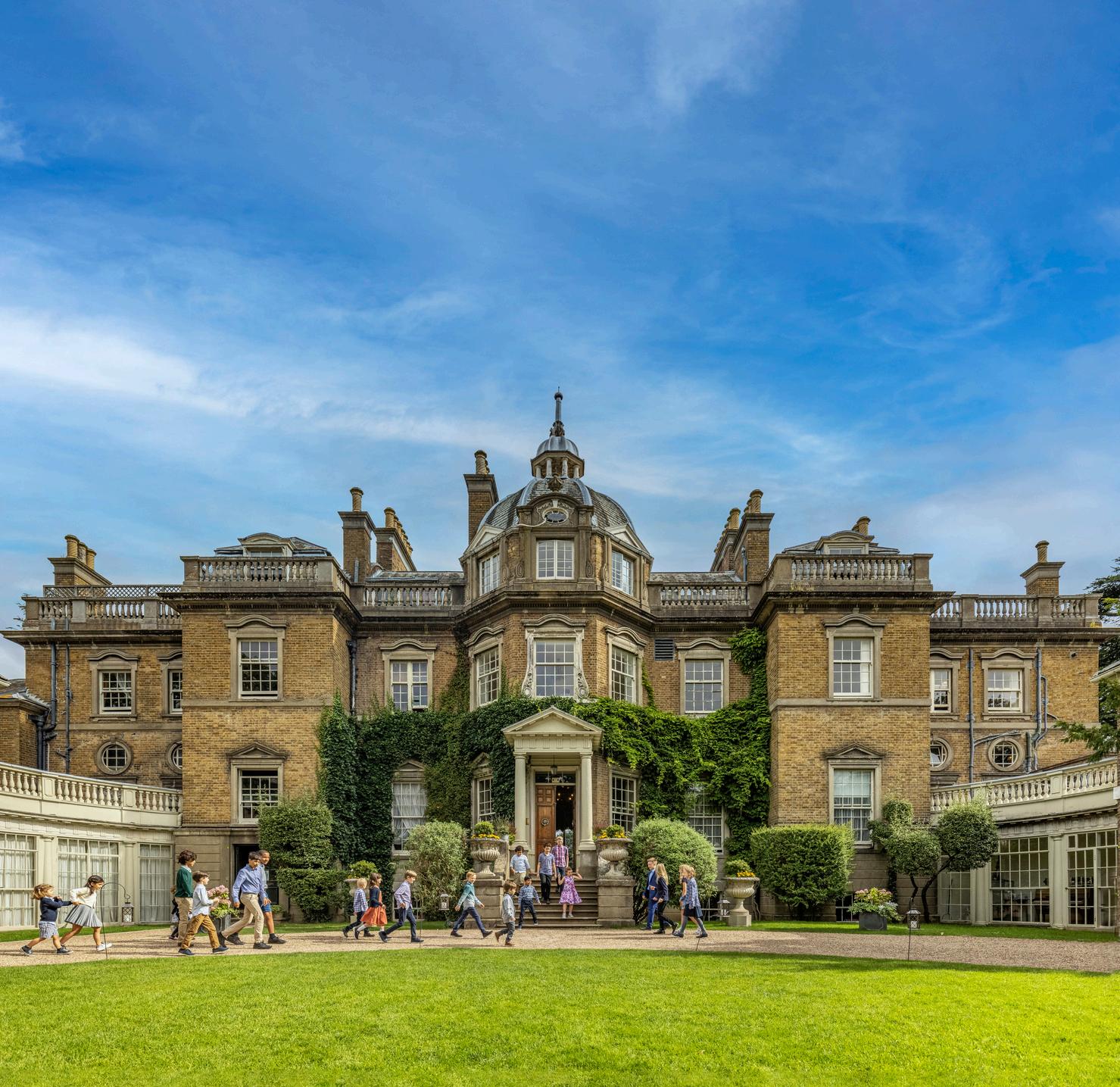
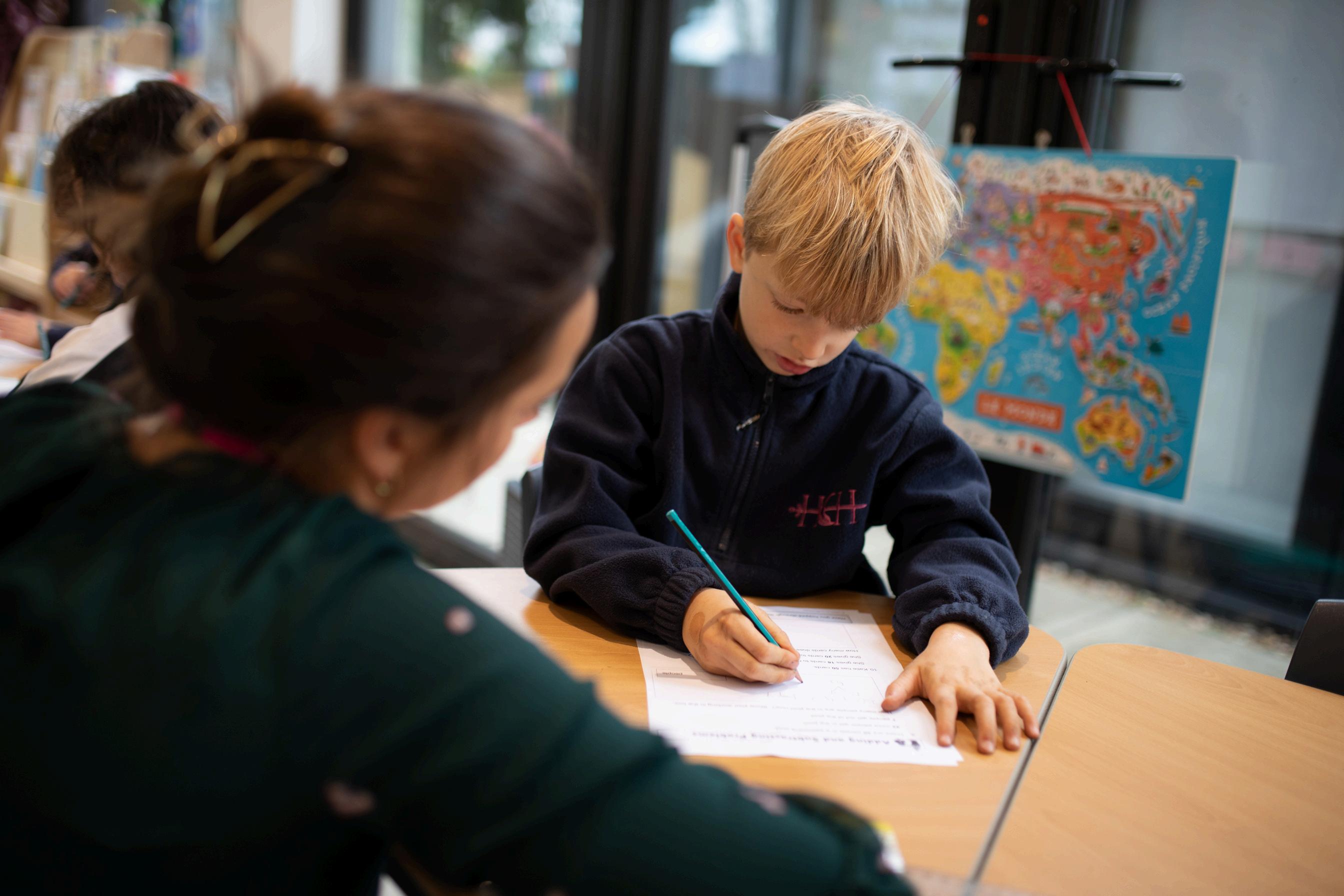

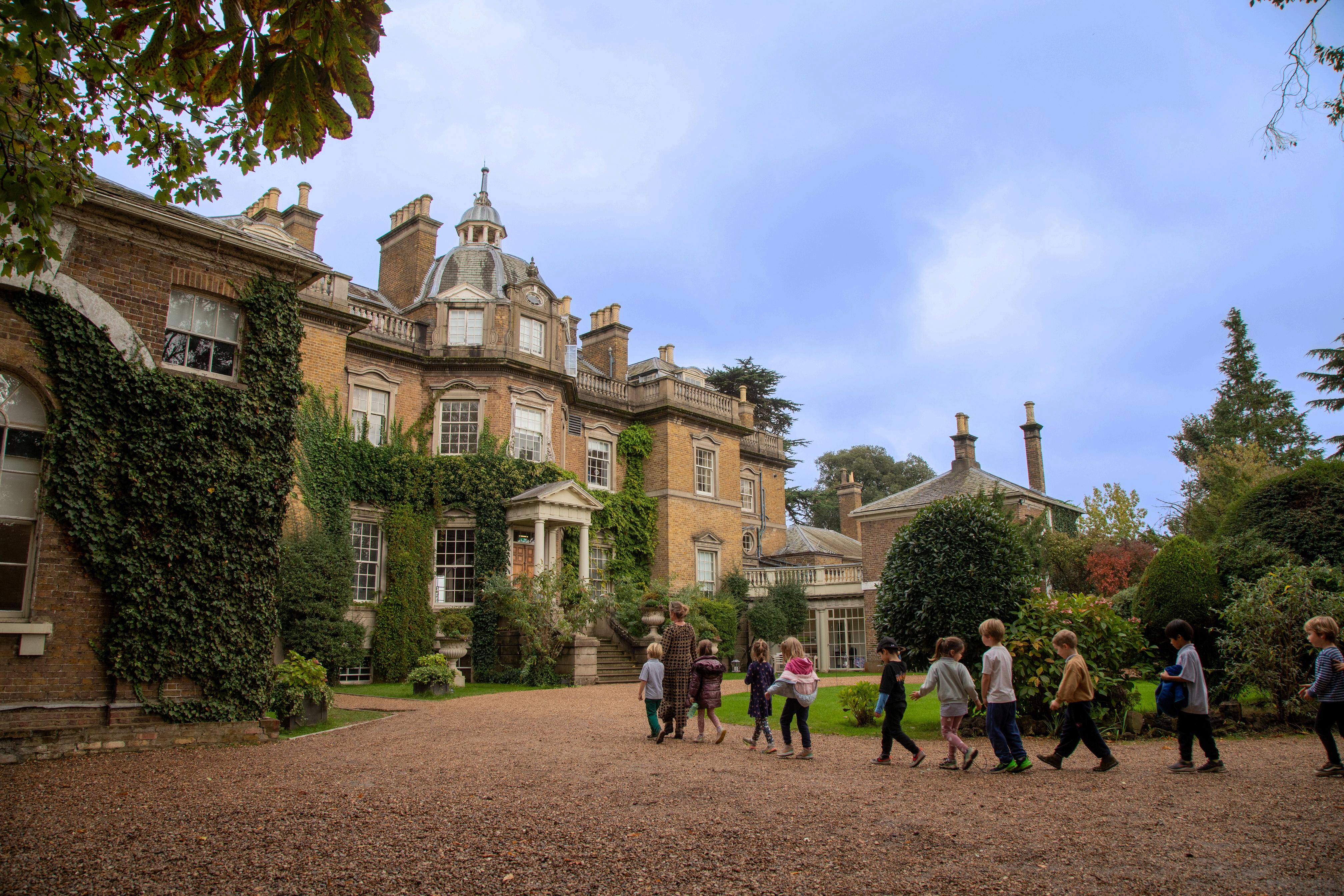








Hampton Court House Prep is about providing an educational experience centred around the child with bespoke approaches for every individual. Whether in classroom settings, extra-curricular activities or charity work, we teach the children to be well-rounded and caring and to contribute to all aspects of school life. Our day-to-day curriculum is one of the foundations of this approach. Lessons are designed to be interesting, engaging, supportive and challenging so that all children feel able to do their best. Teachers will always enable children to contribute fully to lessons, learn and demonstrate new knowledge, skills and ideas, and to shape their voice as part of a dynamic, but homely, community.
At Hampton Court House, our Years 1 – 6 curriculum is designed with the holistic development of each child in mind. We aim to cultivate a love for learning, curiosity, and confidence in our students. Central to our intent is the bilingual program for Years 1 – 4, where approximately 50% of the curriculum is delivered in French. This unique approach not only enhances language skills but also broadens cultural understanding and cognitive flexibility. Our goal is to support every child’s intellectual, social, and emotional growth through a rich and balanced curriculum where mistakes are accepted, and questions welcomed.
Our curriculum is implemented with a focus on creating an inclusive, engaging, and supportive learning environment with a sense of fun. For Years 1 – 4, the bilingual program integrates French into everyday learning, covering subjects such as humanities, science, sport and the arts in both English and French. This immersive approach helps students develop proficiency in both languages naturally and enjoyably, with in class support used to ensure all children are able to understand and access the curriculum. Lessons are structured to build on previous knowledge, ensuring a smooth progression. Within years 5 and 6 more specialist teachers are used to deliver the curriculum which allows for the development of skills necessary to start their secondary education in year 7. We employ a variety of teaching methods, including individual tasks, group work, and hands-on activities, to cater to different learning styles. Continuous assessment practices allow us to monitor each child's progress closely and provide personalised support as needed.
Impact
The impact of our carefully crafted curriculum is seen in the enthusiasm and active participation of our students. They develop strong foundation skills in literacy, numeracy, and science, along with the ability to think critically and solve problems. The bilingual program enhances their language skills and cultural awareness, giving them a broader perspective and improved cognitive abilities. Our students also grow in confidence, independence, and social skills. Regular assessments demonstrate enhanced academic progress and personal development, ensuring that students are well-prepared for the next stage of their education with a lifelong love of learning and a unique bilingual advantage.
Key contacts
Susie Byers Head of Prep sby@hchnet.co.uk
Eldon Fayers Assistant Principal | Teaching & Learning efa@hchnet.co.uk
Imogen Stone
Prep Head of Teaching & Learning ist@hchnet.co.uk
Nick Edwards Assistant Principal | Data & Assessment ned@hchnet.co.uk
Paul Pearce
Deputy Head | Operations & Academic pgp@hchnet.co.uk


To complement their work in English lessons, students will develop and improve drawing skills by collaborating on a large-scale superhero cityscape, complete with skyscrapers, villains and superheroes. After half term, pupils will be learning about the inspiring characters created by textile artist Donna Wilson. In response, they will draw on their imagination and creativity to design and stitch their own hand puppet. Pupils will work to improve their scissor skills and learn new sewing skills, using a simple running stitch to attach the fabric together
Term
Autumn 1
Autumn 2
Spring 1
Spring 2
Summer 1
Summer 2
What are we studying?
Art Calendar: Making art inspired by artists Yayoi Kusama, L S Lowry, Henri Matisse, Barbara Hepworth, Eileen Agar
Art calendar: Making art inspired by artists Mary Fedden, David Hockney, Peter Blake, Howard Hodgkin, Andy Goldsworthy
Solar System: Using a variety of different techniques and materials, pupils will create patterned and textured papers with which to represent the planets on an outer space collage
Clay: Taking inspiration from the work of Clarice Cliff, pupils will learn to master the pinch pot technique to create colourfully decorated pots which will be fired in the kiln
Superheroes: Working on a large-scale collaborative piece, pupils will study the drawings of James Gulliver Hancock and create a cityscape in which to place various superheroes, villains and villainous inventions
Sewing project: Taking inspiration from textile designer Donna Wilson, pupils will design and stitch a hand puppet This project aims to develop fine motor skills and introduces pupils to the properties of fabric and how to master a basic running stitch

Pupils will have a real-life experience by taking care of ducklings and caterpillars, as well as adapting their behaviour in order for the ducklings to gain their trust. Pupils will deepen their understanding of the subjects of Humanities learning first notions of History, Geography and Biology.
During the Summer half-term, pupils will compare the mineral, vegetable, animal and human kingdoms. We will learn how to identify the characteristics of living beings. We will compare different habitats. We will analyse the dietary relations between living beings and draw food chains. We will observe the interactions between animals and their environment. Finally, we will learn about the life cycle of ducks and butterflies from the egg to birth/metamorphosis. To learn how to be responsible, taking care of them, feeding them.
We will identify the characteristics of habitats of human beings through an understanding of historical concepts such as continuity and change, cause and consequence, similarity, difference and significance, and use them to make connections.
We will interpret a range of sources of geographical information, including maps and use basic geographical vocabulary to refer to key physical features. We will learn about geographical similarities and differences through studying the human and physical geography of a small area in the city or in the countryside. Finally, we will list the reasons why it is important to protect the environment and respect all living beings.

Term
Autumn 1
Autumn 2
Spring 1
Spring 2
Summer 1
Summer 2
What are we studying?
Orientate themselves in the school area thanks to photographs, drawings, and maps.
Understand the reasons for extreme climates in cold and hot deserts, (link climates and landscapes).
Understand the days of the week, months, seasons and weather.
Compare Past, Present and Future by considering evolution through lifestyle and education.
Explore how visual representations of places inform our understanding of them - identify a familiar place out of familiar surroundings.
Name the parts of the body and understand their functioning.
Understand and be aware the importance of having good oral hygiene habits, a well-balanced diet and practising regular sporting activities, (take care of one’s own body and treat it with respect).
Discover the Earth and its representations (globe, planisphere, maps).
Discovery of The United Kingdom and its countries.
Identify and name a variety of common wild and garden plants, including deciduous and evergreen trees.
Identifying the plants and predicting what they will turn into when they are fully grown.
Significant historical events, people, and places in their own locality: St Patrick’s day and St George’s day.
Situate countries on a map.
To recognise their flags, to know their capital cities and some important monument/information.
Use the prepositions of space properly.
Compare and group together a variety of everyday materials based on their simple physical properties.
Study historical events that are significant nationally or globally
Describe cities, towns and villages.
Compare urban and rural spaces by talking about advantage and inconvenient and use basic geographical vocabulary.
Find out about and describe the basic needs of animals, including humans, for survival.
Understand the development of a duckling in an egg and then how a duckling grows into a duck.
Significant historical events, people, and places in their own locality/ globally.
Sustainability with links to exploitation of resources in the beach.
Taking of the environment, recycling, reduce and re-use.
Describe how animals obtain their food from plants and other animals, using the idea of a simple food chain, and identify and name different sources of food.
Be able to categorise specimens according to their features (Herbivore, Omnivore, Carnivore).


Year 1 Curriculum Overview
The children will continue to work through the RWI programme in the morning and complete the child focussed and targeted tasks set by each group leader.The children will start the term looking at stories about superheroes. They will explore how to write descriptive sentences. They will also look at using antonyms and comparisons and using capital letters from proper nouns. They will then move on to reading the book ‘Dear Greenpeace’ by Simon James. They will explore the features of letters and write their own. The children will read a range of traditional poems. They will learn what homophones are . They will also look at the use of repetition and rhyme and how to perform poems.
In the second half of the term, the children will read the Max stories by Ed Vere. They will learn how to sequence sentences to write short narratives Next the children will look at different books about animals, comparing nonfiction and fiction texts They will learn to write factually
How it will be assessed
Assessment will be through daily marking and feedback. Through discussion and questioning. At the end of each unit the children will be writing in the style of the author or poet they have been reading There will also be informal assessment of writing, reading and SPaG at the end of each term
Term
Autumn 1 RWI Phonic Focus
Familiar Settings: Family Stories
What are we studying?
Repeating Patterns: Mrs Armitage on Wheels
Autumn 2
Spring 1
Spring 2
Summer 1
Summer 2
Commands & Requests: What You Shouldn’t Do at School Rhyme & Patterns: Poems with repeating patterns and rhymes
Traditional Tales & Fables: Sharing and retelling Poems on a Theme: The Senses
Stories on a Theme: Funny Stories
Information Texts: Night-Time Animals Poems on a Theme: The Senses
Stories on a Theme: Superheroes
Letters & Postcards: Dear Greenpeace
Traditional Poems
Modern Fiction: Ed Vere stories
Information Texts: Comparing Non-fiction & Fiction
Traditional Poems


Our Summer Forest School Programme fosters confidence and independence through play, discovery, and skill-building. The summer term builds on spring’s outdoor learning, offering children opportunities to explore, create, and develop practical skills in nature. Activities encourage teamwork, resilience, and environmental awareness through hands-on experiences. Safety remains a priority, with sun protection, clear tool-use guidelines, and risk assessments. Engaging families through workshops and events enriches this memorable outdoor learning experience
Topics and Activities
Nature Discovery: Bug hunts, tree ID, and pond dipping.
Bushcraft & Shelter Building: Den making, knot-tying, and safe fire lighting.
Outdoor Cooking: Campfire recipes.
Creative Arts: Leaf pressing, mud painting, and nature weaving
Sensory & Mindfulness: Barefoot walks, quiet sit spots, and nature mandalas.
Water Play: Exploring ponds and streams safely.
Team Games & Challenges: Obstacle courses, tracking, and hide-and-seek.
Storytelling & Imaginative Play: Nature-inspired tales and cloud watching

Autumn 1
Autumn 2
Spring 1
Spring 2
Summer 1
Summer 2
What are we studying?
Safety in the natural environment and taking safe and supervised risks
Observing the changes in weather and in the natural environment for Autumn and Winter
Celebrate Autumn Harvest and Christmas
Building dens and using tools safely
Celebrate Chinese New Year and harvest from community garden to cook a Chinese meal on the open fire
Celebrate National Birdwatching and make bird feeders for winter birds
Fairytales and stories that link to play in the natural environment
Celebrate National Wildlife Day
Observing new changes in the natural environment coming into Spring and planting
Celebrate World Bee Day
Minibeasts, map making and treasure seeking

Year 1 Curriculum Overview Summer Term 2025
This term, year 1 will develop pleasure in reading and understanding by learning how to read and discover new sounds [ch], [v], [r], [b], [t], [j] using the Alpha's method They will apply phonic knowledge and skills as the route to decoding syllables and simple words. During the lesson, the pupils will learn vocabulary about emotions, feelings, sickness, food, drinks, order in a restaurant and breakfast. They will also reinforce our knowledge of feminine, masculine, singular and plural of nouns
Year 1 will also develop their cultural knowledge by listening to French stories. Finally, they will hear and watch different authentic audios, videos and sing songs.
Term
Autumn 1
Autumn 2
Spring 1
Spring 2
Summer 1
Summer 2
What are we studying?
We will discover the following new sounds [a], [e], [i]. We will learn vocabulary about themselves, politeness, instructions, stationery. We will also develop their cultural knowledge by learning about Loup, listening to French stories.
We will discover the following new sounds [o], [u], [ê]. We will learn vocabulary about numbers from 1 to 20, colours, weather, daily routine. We will also develop their cultural knowledge by learning about Loup, listening to French stories.
We will discover the following new sounds [s], [l], [p]. We will learn vocabulary about family, pets/animals, house. They will also discover feminine and masculine nouns. We will also develop their cultural knowledge by learning about Loup, listening to French stories.
We will discover the following new sounds [m], [n], [f]. We will learn vocabulary about the body parts, clothes. We will also develop their cultural knowledge by learning about Loup, listening to French stories.
We will discover the following new sounds [ch], [v], [r]. We will learn vocabulary about emotions, feelings, sickness. They will discover the singular and plural. We will also develop their cultural knowledge by learning about Loup, listening to French stories.
We will discover the following new sounds [b], [t], [j]. We will learn vocabulary about food, drinks, order in a restaurant and breakfast. We will also develop their cultural knowledge by learning about Loup, listening to French stories.

In the Summer term, Year 1 will continue their journey into French culture by discovering key celebrations and traditions. We will start with la fête du 1er mai, a day dedicated to workers and symbolised by the gifting of lily-of-the-valley flowers.
Mother’s and Father’s Day in France, highlighting the heartfelt ways families show appreciation for their parents, as students learn a traditional poem, discover a French song, or create a special card.
As June arrives, we will celebrate la Fête de la Musique, a nationwide festival where streets come alive with performances from musicians of all kinds and discovering French singers and different styles of music.
Students will also learn about le Tour de France, following the excitement of the world-famous cycling race and its challenging routes through the French countryside. The term will conclude with the vibrant festivities of le 14 juillet, France’s national day, as we explore its grand fireworks displays, parades, and joyful celebrations across the country.



The Summer term will consist of 6 main topics in Maths; Multiplication and Division, Fractions, Position and Direction, Place Value, Money, and Time
Multiplication and Division
Counting in 2s
Couting in 10s
Counting in 5s
Making doubles
Fractions
Finding half of an object
Finding hald of a quantity
Finding quarter of an object
Finding quarter of a quantity
Position & Direction
Describing turns
Describing forward and backward
Describing below and above
Place Value
Count from 50 to 100 Tens to 100
The number line to 100
Comparing numbers
Money
Recognising coins
Recognising notes
Time
Days of the week
Months of the year
Hours, Minutes, and Seconds
Telling the time
Term
Autumn 1 Place Value Addition and Subtraction
Autumn 2 Addition and Subtraction Shape
Spring 1
What are we studying?
Developing Place Value Consolidation of Addition and Subtraction
Spring 2 Length and Height Mass and Volume
Summer 1
Summer 2
Multiplication and Division Fractions Position and Direction
Further Place Value Money Time


In the Summer Term of 2025, Year 1 students will primarily engage in outdoor activities during Physical Education lessons, with a focus on introducing and enhancing their Athletics skills. The aim is to foster enjoyment, participation, and achievement in athletics, culminating in a Sports Day during the final half of the term.
Students will acquire techniques related to running, jumping, and throwing, along with the fundamental rules governing each competitive event. They will explore the distinctions between skills needed for short-distance sprints and longer-distance running. Instruction will be provided on both individual skill development and teamwork, exemplified through activities such as relay races. Additionally, students will play cricket – learning about the basics of bowling, batting and fielding. As always, children will be encouraged to take pleasure in sports and maintain an active lifestyle Emphasis will also be placed on the significance of setting and striving to achieve personal goals regarding their performance in terms of timing and throwing distances. A spirit of healthy competition and fair play will be actively promoted.
Autumn
Spring
Summer
What are we studying?
Football: passing, shooting, dribbling, conditioned games.
Netball: passing, shooting, attack vs defence, positions and conditioned games.
Gymnastics: balances, body shapes, travel, jumps and rolls
Games: balance, coordination, agility, throwing and catching.
Cricket: throwing, catching, batting, bowling and fielding.
Athletics: sack race, long jump, javelin throw, obstacle race, relay, 60m sprint.
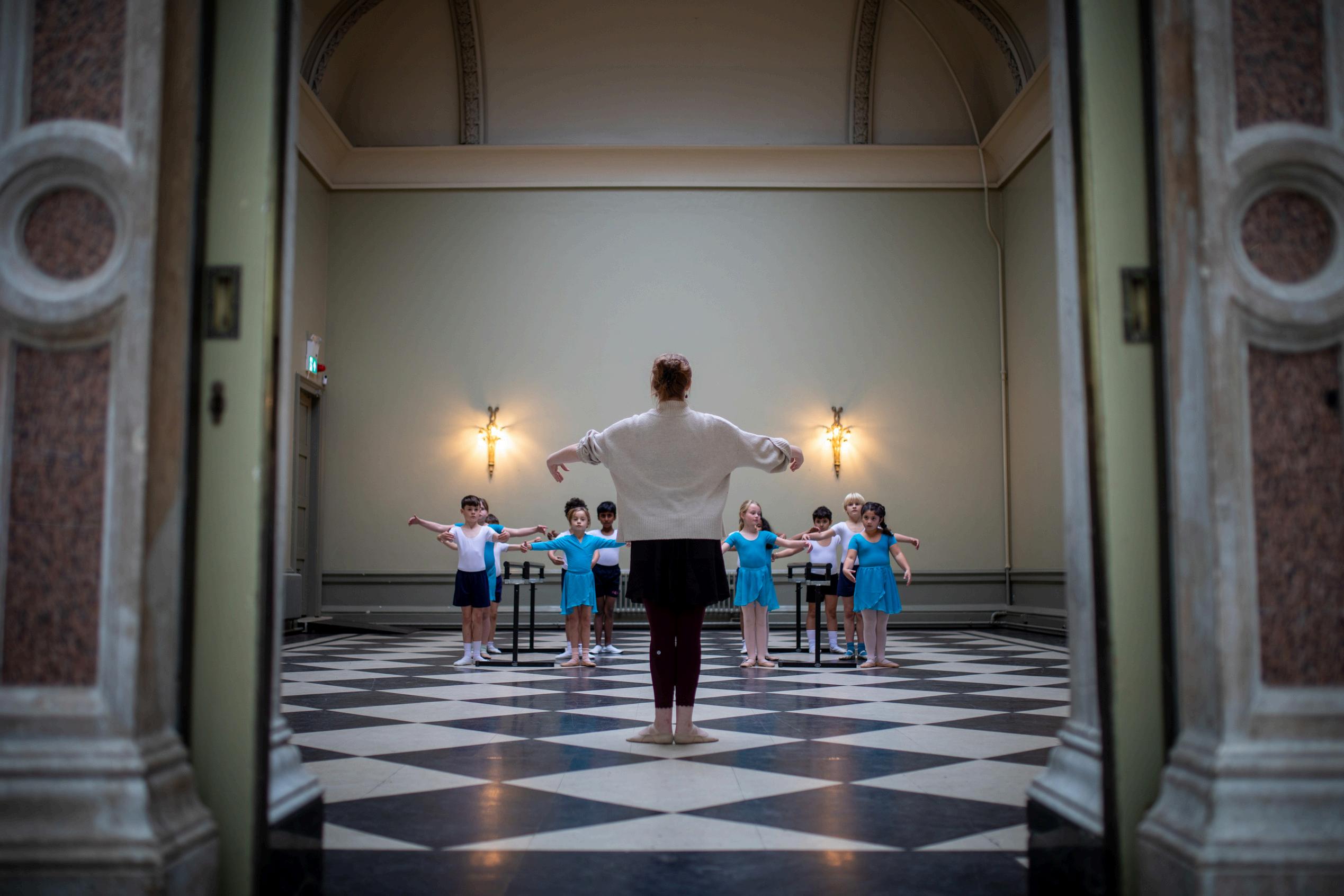

This term students in year 1 – 4 will be preparing for their showcase on the 12th June around the theme of Fairy Tales.
Throughout the year, there will also be numerous recitals and concerts, providing students with platforms to display their musical abilities and talent.
At Hampton Court House, we believe that the performing arts are integral to our school community. Therefore, students will actively participate in various performances throughout the year. These performances form the backbone of our curriculum. We are committed to offering inclusive opportunities that allow every student to showcase their talents.
To prepare for these performances students will focus on developing spatial awareness, musicality, vocal, physical, and character skills to enhance their performance abilities. They will learn stage craft and understand how to engage an audience.
Additionally, we place a strong emphasis on collaborative and creative skills, which are essential for every child's growth. Our classes incorporate engaging games and activities designed to foster teamwork, improve peer interaction, and develop the ability to follow directions. Students are encouraged to contribute creative suggestions through music, movement, and dialogue, ensuring a well-rounded arts education at Hampton Court House.


In the first half of the summer term, we will be focusing on the Relationships topic, which explores families and understanding that there are many different types. Friendships, including how to make friends and how to solve friendship problems when they occur. As well as respect for others and treating people with kindness. We will look at what makes a good relationship and how to help yourself and others when they are upset.
In the second half term we will explore Healthy Me, in which we will discuss healthy eating and healthy choices, having a balanced diet and being physically active. We will finish by looking at how to keep themselves safe, road safety and dealing with difficult situations.
Please do remember that parents can request any topics or lesson resources at any time.
We aim to make all PSHE sessions as relevant to the students and their current needs and concerns, therefore out content is changeable, and suggestions and feedback are welcome at any time from students and parents.
How it will be assessed
PSHE lessons are predominantly discussion based, with some written tasks for deeper comprehension and application. At the end of each lesson, the students will complete self-reflection sheets for teachers to monitor understanding and adapt future teaching. Teachers keep track of the students’ levels and understanding of the different elements of PSHE across the year.
What are we studying?
Autumn 1
Being Me in my World Feeling special and safe My class Rights and responsibilities Rewards and feeling proud Consequences
Autumn 2
Spring 1
Summer 1
Dreams and Goals Steps to goals Achieving together
Having a positive attitude Overcoming obstacles
Relationships Families Making friends Greetings People who help us
Being my own best friend
Spring 2
Summer 2
What are we studying?
Celebrating Difference
Similarities and differences
What is bullying?
What do I do about bullying? Making new friends
Changing Me Life cycles My changing body Boys’ and girls’ bodies
Coping with changes
Healthy Me
Being healthy Healthy choices
Clean and healthy Medicine safety Road safety
